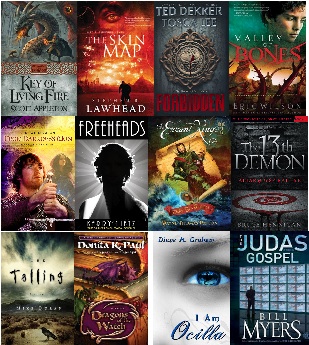Two weeks ago I wrote an article for Speculative Faith that used the Bible, focused on the Epistles, to in detail discuss what the Bible says about what Satan (a.k.a. the Devil) is trying to accomplish in the world. Or in military terms, what are his objectives, because his most basic desire can be more simply summarized as hating God and God’s works. But that most basic desire is accomplished by a number of objectives we know about from the Bible, and once we know Satan’s objectives, we can understand by comparison with human warfare what kind of war the Devil fights. Because there are many kinds of human warfare–and which kind is most like the kind of war the Devil engages in?
While discussing what kind of war the Devil fights, we’ll also look at how knowing this could inspire story ideas that cover spiritual warfare.
So to summarize the objectives I laid out two weeks ago, what are Satan’s goals according to the Epistles?
- Primarily to tempt Christians not only to sin, but to live lives under the control of sin (of numerous kinds, but to include sexual sin). (Two of many passages: I Timothy 5:14-15 and I John 3:8)
- To delude Christians and non-Christians alike into believing things that are not true concerning spiritual realities (a.k.a. false doctrine or false attitudes). (Example passage: II Timothy 2:24-26)
- To insert false believers and teachers into Christian congregations–people who appear to be believers, but are working Satan’s will. (Examples: Matthew 13:39; II Corinthians 11:13-14)
- To motivate human beings to kill followers of God as a fall-back position to corrupting them through sin and false doctrine. Or perhaps, seek to kill believers directly. (Hebrews 2:14)
- To remove information about the Gospel from as many unbelieving minds as possible. (Luke 8:12).
- To at times possess the bodies of human beings, but based on the Epistles, this would have to be a minor objective. (Likewise, the Epistles don’t absolutely rule out demonic possession or occupation of physical places, but never mentions that happening directly, so at most this would be a minor objective.)
- To otherwise oppose any work of ministry. (I Thessalonians 2:18 and II Corinthians 12:7)
- To do all of the above with an eye to maintaining control of the systems of the world. (Example passages: Ephesians 2:2 and Ephesians 6:12)
A common theme of most of the above is influence. The Devil works through influence and control of information. So it would seem at first glance that the best analogy with the kind of war Satan is fighting is that he’s engaged in information warfare–or as the US military calls it, “Information Operations” or IO.
But wait a minute, I think I need to step back and explain some basics about warfare here before talking about IO. You see, I think a lot of people tend to think that the goal of war is to kill as many of the enemy of possible while avoiding having the enemy kill your people. So warfare in the mind of many is mainly about killing. But that’s not actually true–at least hardly ever.
The goal of warfare in general is to get the enemy to accept (or bend to) the attacker’s will. So a war launched to take territory or to capture valuable goods (a.k.a. “spoils of war”) which has been the motivation for the vast majority of wars fought in human history, is about getting the enemy to give up his claims to a patch of land or a set of possessions. To use force to impose the attacker’s will on the enemy, so that the enemy gives up the possessions the attacker wants. Or to get the enemy to accept the new ruling monarch or the new government system or the new religion–or some other specific goal.
Of course if the mere threat of force can obtain the compliance, all the better. It’s incredibly rare in the history of the world for an attacking army not to accept a surrender without a fight. Again, the point of a war is in general to gain objectives, to bend the enemy to your will–not to kill as many as possible.
If the defender doesn’t roll over and surrender without a fight, it may be necessary to damage an enemy army to such a degree that it cannot defend what it wants to defend–it can no longer resist–even though it would like to. In which case it is forced to retreat or sign a treaty or otherwise yield up what it possesses. Still, unless the defender chooses to fight to the last man–which almost never happens in warfare–what is actually happening is the loser of the war eventually surrenders to the winner.
The only time this isn’t wholly true is if the goal of warfare is genocide–in the case of genocide, the actual goal is to kill all the enemy. But in fact, true deliberate genocide is uncommon in the history of warfare. Almost all war that human beings fight is actually about breaking the enemy’s will to resist and getting them to comply with a set of goals. I.e. warfare, even physical warfare, is mainly about getting people to comply with a specific claim, desire, or idea. Even a military operation with the goal of genocide would actually prefer the enemy accept what’s happening and stop resisting against it so they no longer represent a danger.
So with the understanding that all warfare seeks to change the opinion of the enemy, at least to the point of agreeing to surrender, we can see there are many means by which warfare is fought. Sometimes types of warfare is identified by the arena in which it’s fought–like naval warfare or air war. Sometimes warfare is identified by the kinds of weapons used–like artillery (or indirect fire) war. Sometimes war is identified by the means by which the war takes place, such as with “Psychological Operations” or “propaganda” or “Information Warfare.” (Note all three of the terms I just used have a similar though not identical meaning.)
Cyberwarfare is an interesting case in which the term applies to both the arena in which the war is fought–the “cyber” or virtual or computer world–and also how it’s fought, i.e. with computer (“cyber”) code. Which also includes the weapons used to fight the war, computers. Cyber war in fact has some interesting parallels with spiritual warfare.

The image is a joke, but cyber warfare isn’t. Image source: Freedom fellowship
Cyber war is going on continuously, even if we don’t see it with your own eyes. Spiritual war is like that, since we normally cannot physically see the Devil and his angels (or God and his angels). Related to that, while you might be tempted to ignore a cyber threat you cannot physically see, if you ignore the threat, you will eventually get some results you really aren’t going to like.
Cyber war involves the enemy planting viruses or otherwise compromising systems whose primary job is to process information. The Devil, in working to tempt people to commit sin, is doing something analogous to planting viruses. Though into human minds. And as a computer virus can spread from one information system to another, so can one person accepting sin affect other people (I Corinthians 5:6).
The kind of warfare going on in computer systems also includes planting false information or stealing information from systems. These actions have direct parallels to what goes on in spiritual warfare at times–Satan trying to create false doctrines and take the very act of hearing the gospel out of the minds of unbelievers.
But the cyberwarfare analogy, which at first glance looks like really good analogy for spiritual war, breaks down in certain ways. First, the computer systems are continually changing in cyber war and the types of attacks are constantly changing, too. So likewise, the types of defense need to change. In spiritual war, while issues do change over time to a degree, mostly Satan leads people into the same kinds of sins today as in the past. Mostly, the types of attacks are the same or at least similar. And the basic defenses are exactly the same. So in the aspect of change, cyber war isn’t like spiritual warfare at all.
There are other aspects of cyber war that are unlike other kinds of war, such as cyber war being more like vandalism at times with no real objective other than to destroy, which is actually rare in real-world war because destruction in war usually has the purpose of breaking the enemy’s will to fight (though perhaps spiritual war includes the equivalent of Satanic vandalism at times). But continual change is a big difference, which is why I emphasized it.
However, even though cyber war only partially matches spiritual war, it might be cool to write a story that makes an analogy between cyberwarfare and spiritual warfare…right?
Note in contrast to cyber war, the famous cases of Christian literature that portray spiritual warfare tend to focus on physical warfare–often on hand-to-hand combat. So the angels swing swords and the demons respond with similar weapons and maybe prayers cast up shields or have other effects on the battlefield. But the battle is shown as a physical fight. There are virtues in doing this–it emphasizes the reality of spiritual war and the real opposition between demonic forces and the army of God. And it’s visceral and catches people’s attention.
But please realize that not even in the human world is warfare necessarily about hand-to-hand combat. War, again, is mainly about getting the enemy to bend to the will of the attacker, not mainly about killing. Cyber war is sometimes only war in a manner of speaking (when talking about virtual vandalism), not real war–but when discussing the operations that say, China takes against the United States government via computer systems (or vice versa) we are talking about a real war–just one that’s invisible to the eye and without physical weapons.
War doesn’t require what we might think of as actual combat to be war. Again, there are many different kinds of war and gaining the ultimate goal doesn’t necessarily require killing anyone, but rather is about bending the will of the enemy to concede the objectives of the war.
The example of the kind of war that is most like spiritual warfare I already said is Information Operations. What I didn’t say is that IO itself is a bit of a euphemistic term. We might be more familiar with IO by the phrase, “propaganda war.” Or psychological operations. (Though these technically have slightly different meanings, for my purposes, close enough.)
For human warriors the modern realization that certain kinds of messaging or information might cause the enemy to become more prone to surrender led to the use of propaganda broadcasts by Tokyo Rose versus allied troops in the Pacific, or Lord Haw-Haw broadcasting at England from Nazi Germany (and Allied replies back the other way, of course). And propaganda had such an important role in bolstering German troops and society that anyone who has studied the history of World War II recognizes the importance of Joseph Goebbels, the Nazi Propaganda Minister. Propaganda was also huge in the Soviet Union of course, but happened among Western allies as well.
Propaganda has become more sophisticated with time, more subtle. The methods of propaganda or “Information Operations” are very similar to advertising. The basic idea is to create a positive association for what kind of behavior you want for the enemy to adopt and a negative association for behavior you want the enemy to avoid. So ads that get us to buy from a fast food chain don’t actually have to persuade us with information that the restaurant is good (though ads on occasion offer reasons why their brand is the best), they merely need to present who they are in a context that gives pleasure. Usually commercial ads stick to the positive, but on occasion portray the competition in negative light–though political ads frequently go negative.
Note that what I did as a Civil Affairs officer in Afghanistan and elsewhere had the purpose of “winning hearts and minds” (as George W. Bush put it) or as I’ve said it here, the purpose of changing the will of the enemy. What I did when I helped fund projects that built schools and roads and bridges and clinics and many other things in Western Afghanistan, was for the purpose of lessening the will of the Afghan people to fight international forces helping the Afghan government, via increasing the positive association ordinary people made between troops from other countries (like me) and good things happening in Afghanistan. Our goal was to give the Afghans a “warm fuzzy feeling” about US troops–something I was able to perform with complete sincerity, because I really did (and do) care about Afghan people and really did want to see things improve in the country and my genuine goals were to help them make their nation a better place. Something they couldn’t help but notice about me.
Not to get too far off subject but the example I gave demonstrates how in the spiritual war we are engaged in, which is much like “Information Operations,” the mere act of loving others is part of the IO we perform. Even if we give IO no thought at all, we are engaging in Information Operations for the benefit of Christianity when we as Christians love other people and show kindness to them, because we create a positive association between our behavior and Christianity.
How exactly we should engage in spiritual warfare in detail, beyond simply “love others,” I hope to address next week. But for now, my goal is simply to demonstrate to the reader of this article what the best human analogy for spiritual warfare actually is. And I believe the kind of warfare most like spiritual war is “Information Operations.”
Lest someone object that IO is a new thing and spiritual warfare certainly isn’t new–therefore the two things cannot be all that much alike, let me say that ancient armies conducted IO in other ways, with less scientific study to be sure, but they conducted it nonetheless. Isaiah 36:13-20 records an ancient Assyrian message intended to change the will to fight of the people of the Kingdom of Judah–a message that promises benefits for surrender, suffering for resistance, and which uses historical examples of why “resistance is futile.” Note Sun Tzu in The Art of War spoke about subjects we’d recognize today as IO. (Note that Satan does seek to portray himself as more mysterious and powerful than he really is–which is not to say he isn’t actually powerful. But in terms of access to real power, Christians have a complete advantage.)

Sun Tzu showing understanding in ancient times of techniques the Devil uses.
And of course the methods employed in Information Operations, while new to the Twentieth Century in the form we have them now, are not at all new to Satan. From the beginning, in Genesis 3, the things the serpent (a.k.a. Satan) said to Eve contain elements of IO. The positive association of the fruit to hidden knowledge was built into the phrase, “you will be like God, knowing good and evil,” and the negative association with God was packed into “For God knows the day you eat of it your eyes will be opened.” (Genesis 3:5) Satan’s goal was to change Eve’s will, to compel her surrender, to get her to comply with his goals (of destroying the works of God). Fighting with ideas, with words. Which is how IO works.
To demonstrate the breadth of Information Operations and how it applies to spiritual warfare, let’s set our discussion of IO in a context that includes other aspects of spiritual war: the Cold War. During the Cold War, the Eastern Bloc, led by the USSR, and the Western allies, led by the USA, engaged in a wide variety of various types of activities with the purpose of demonstrating the superiority of one side over the other. (Note the West really was superior economically, though not in every other way–but the Communist bloc nonetheless claimed to be superior in every regard.)
The USA, for example, funded jazz musicians taking tours around the world, or exhibits of American art doing the same thing. The goal was create a positive association between the United States and the popular music. Of course, it would have been self-defeating to fund tours of musicians nobody enjoyed listening to–which demonstrates why Christian artists need to care about the entertainment value of our work, because for writers who produce a quality story as an overt Christian, that in itself has value for helping out the Christian “brand” in the world. Though of course, just as the USA would not have funded musicians from America going on tour with overtly anti-American music, likewise the positive association of a well-written story created by a Christian can be undone by the message the story contains. But to a certain degree, the message isn’t as important as making a positive impression.
Certainly a terribly-written story with a good theme can do damage to the reputation of Christianity–though note that not everyone will agree on what is terribly written.
Note the Cold War IO (or with a negative association, “propaganda”) was directed only secondarily at the true believers on the other side. Primarily the goal of all that effort was to sway nations somewhere in the middle of the two camps to join one side or the other. And at times, such efforts led to shooting wars in which people got killed. And at times, the spiritual war leads to people getting killed, too, such as recently (from the time this article was written) in Burkina Faso, where armed Muslim militants from across the border with Niger herded all the males out of an Evangelical church and shot them, killing boys as young as ten. (Why didn’t they kill the women, too? Because on occasion, even Muslim militants perceive the value of avoiding bad press.)

I read this very detailed academic tome as part of a class on the Cold War for my MA in History. While a bit dry, this book explains in great detail the wide variety of IO the USA performed during the Cold War.
Note the analogy with the Cold War certainly has flaws, even though it’s useful. Satan is much less powerful, relatively speaking, than God. The West versus East struggle of the Cold War was actually more even. But in terms of discussing propaganda, I think making this analogy is helpful.
I want to mention just one more useful bit of analogy when comparing spiritual war to Information Operations during the Cold War before wrapping this up. Note that the United States had a series of radio stations operated by the United States Information Agency. These stations constituted the “Voice of America” (which continues to exist under different management). One thing the VOA wanted to do was attract listeners by being an objective source of news. The VOA did not avoid talking about bad news or things that were wrong with America. But it talked about them in a way that emphasized positive changes and attempted to explain historic situations, such as US racism and segregation. The deliberate honesty of the VOA actually served the purpose of disseminating the information the VOA wanted to disseminate–because people knew the broadcast was reliable.
On the other hand, the CIA operated radio stations that broadcast the “Radio Free Europe” programs. Radio Free Europe didn’t want to be seen as blatantly partisan in favor of the USA, but they in fact did not attempt to maintain neutrality at all in their broadcasts. Every broadcast was meant to be pro-USA and Western Allies in a way that would cause listeners in Eastern Europe to doubt their resolve in remaining loyal Communists.
Note that Radio Free Europe and Voice of America worked in parallel with one another. I believe likewise there is actually a place for Christian fiction that portrays Christian values in idealistic terms, including heroes who are paragons of virtue, along with other Christian works that are honest about what is wrong with Christians and Christianity, while still trying to make context clear. Both types of story, if well-written, can serve a good purpose.
So how does all this affect how we live as Christians, particularly as Christian writers and artists? More on that topic next week, God enabling.
But concerning the topic of how we portray spiritual warfare in speculative fiction stories, can you see that we do a disservice to the topic of spiritual warfare by only portraying spiritual war as a battle between angels and demons swinging weapons at each other? Certainly there’s a place for such tales, but why shouldn’t we have stories about spiritual cyber warfare, with spiritual viruses infecting people? (I know of one story world that attempted to write about spiritual cyber warfare, but it suffered from being difficult to read and only partially went the direction I’m suggesting. I also found an article in which a Christian group mentioned that its servers are regularly attacked–which isn’t at all what I mean by “spiritual cyber warfare.”)
Or perhaps we should we have stories that portray Satan as a propagandist? Or even perhaps stories that may show invisible physical combat, but which would include the power of information and getting the message across to vulnerable people who might be swayed? Or, on the other hand, stories that portray distracting people from the word of God by various means? A story about demonic “seed snatchers” perhaps?
What are your thoughts on this topic in general? And what stories have you read, if any, that portray spiritual warfare in a way different from a hand-to-hand physical fight?
No magic memories, radioactive-nosed reindeer, or any other Christmas corniness would serve up a Holiday Miracle to get me out of this mess.











































 I saw the word speculations pop up in a most disconcerting way in Romans 1. After Paul’s greeting to the Roman believers he hopes to visit, he goes to some length to explain the slide into sin which humankind has experienced. Early in the process, he identifies this cause:
I saw the word speculations pop up in a most disconcerting way in Romans 1. After Paul’s greeting to the Roman believers he hopes to visit, he goes to some length to explain the slide into sin which humankind has experienced. Early in the process, he identifies this cause: I’ll be honest: I don’t particularly enjoy supernatural stories. There are indeed real angels and real demons, but rarely have I read a story that aligns the supernatural beings about which they write, with anything true from Scripture. The same is also true about witches or divination. In other words, what the Bible refers to and the pretend beings in the speculative stores are not the same.
I’ll be honest: I don’t particularly enjoy supernatural stories. There are indeed real angels and real demons, but rarely have I read a story that aligns the supernatural beings about which they write, with anything true from Scripture. The same is also true about witches or divination. In other words, what the Bible refers to and the pretend beings in the speculative stores are not the same.





 I’ve been an armchair theoretical physics fan for a couple of decades now. My favorite book on the subject is Dr. Michio Kaku’s romp through hyperspace, appropriately titled Hyperspace (and I will never get tired of telling anyone who will listen that Dr. Kaku once called my house when I was sixteen to interview me for his radio show after I had emailed my praises for his futuristic tome Visions). String theory, ten dimensions, wormholes, particles and waves – all that stuff really excited me as a teenager. Still does, though not with the same giddiness. These days, it’s more of, “Man, isn’t God amazing?”
I’ve been an armchair theoretical physics fan for a couple of decades now. My favorite book on the subject is Dr. Michio Kaku’s romp through hyperspace, appropriately titled Hyperspace (and I will never get tired of telling anyone who will listen that Dr. Kaku once called my house when I was sixteen to interview me for his radio show after I had emailed my praises for his futuristic tome Visions). String theory, ten dimensions, wormholes, particles and waves – all that stuff really excited me as a teenager. Still does, though not with the same giddiness. These days, it’s more of, “Man, isn’t God amazing?”

 As if that wasn’t enough, a group of shepherds crowded into their quarters to worship her baby. Angels, they said, had told them about this child—where he’d be born and how they could find him and how they would know him.
As if that wasn’t enough, a group of shepherds crowded into their quarters to worship her baby. Angels, they said, had told them about this child—where he’d be born and how they could find him and how they would know him.







